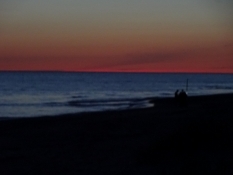Radtour Eiserner Vorhang, Teil 1: Klaipeda-Grense Jakobselv
Dag 5, etape 5: Klaipeda-Pukarags
![]()
Bitte warten - Kartendaten werden geladen
Erstellt am 30.06.2017
am 30.07.2017
Strecken-Merkmale
gefahren
Gesamtlänge in km
82
Gesamthöhenmeter Aufstieg
641
Durchschn. Steigung Aufstieg %
0,78
Gesamthöhenmeter Abstieg
617
Gesamtsattelstunden
5,3
Durchschnittsgeschwindigkeit in km/Std.
15,5
Informationen zu Rechten an den GPS-Track-Daten | |
|---|---|
Rechte-Inhaber | |
Rechte-Ausprägung / Lizenz | cc0: Public Domain keine Rechte vorbehalten |
Link zur Rechtebeschreibung | |
gpx-Datei hochgeladen | durch Ottocolor am 03.07.2017
|
Gesamtzahl Trackpoints
1.303
Trackpoint-Dichte per km
16
Endorte
Start
Klaipėda, Klaipeda County, LT (0 m NHN)
Ziel
Rucavas novads, Courland, LV (8 m NHN)
gefahren am
05.05.2017
Wetter
Sunny and warm weather with a few clouds, 20 to 22°C, in the evening quite chilly. Weak winds from East and South.
Unterkunft
Pukarags
Pape, Rucavas pagasts
LV-3477 Liepajas rajons
Beschaffenheit
The first day of the second part of the Iron Curain Tour, the five days from Klaipeda to Riga. It's the first part of the Tour proper after the introducional part from Naesby to Klaipeda.
Steigungs-Verteilung
Bemerkungen
Departure at 9.15 (the arrival of the ferry to Klaipeda harbour), arrival at 20.15, i.e. 11 hours with stops. Avg. speed with stops: 7.4 km/h. Max. speed 26.0 km/h. Odometer after the stage: 436 km. Remaining distance: 3,449 km.
Reisebericht
Text message, May 5, at 8.06: Good morning dear lifeline. I'm lying in my berth on Athena Seaways, which has sailed me to Lithuania in the course of the night. The other passerngers in my cabin speak Lithuanian with each other, so now I feel myself totally abroad. Excited! The cycling business yesterday was again "jobby", as the Swedes say. A strong headwind, which also made the ship sway, but the plaster against seasickness behind my left ear kept this problem at bay. In Klaipeda I've got the address of a bike repair shop, where they hopefully can adjust my speed shifts. I've fiddled with it myself, but I've only made things worse. That done my journey up North begins. Before night falls I'm in Latvia on a camp site on the very beach of the Baltic Sea. Here in Lithuania there's said to be a good cycling route along the coast through the holiday landscape. Now breakfast is waiting here on the ship. Have a nice Friday. Hugs from Helmuth.
Informationen zu Urheber-Rechten | |
|---|---|
Rechte-Ausprägung / Lizenz | by-sa: CREATIVE COMMONS Namensnennung, Weitergabe unter gleichen Bedingungen |
Link zur Rechtebeschreibung | |
übernommen / bearbeitet am | 25.07.2017
|
übernommen / bearbeitet durch |
|
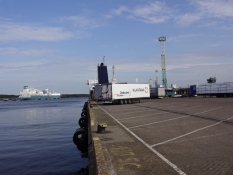
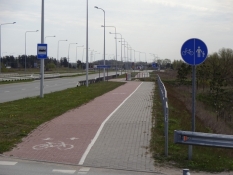
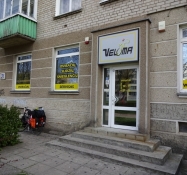
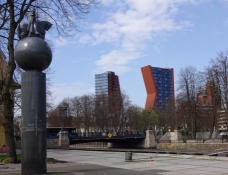
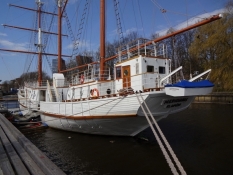
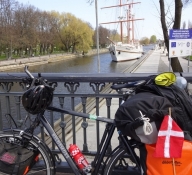
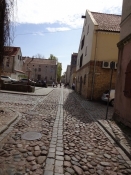
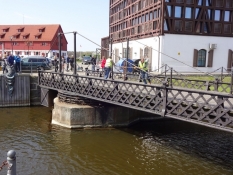
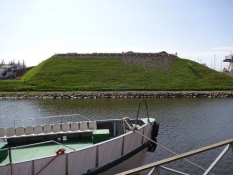
Those were my thoughts while approaching the Lithuanian coast and the former "Iron Curtain", which was the theme of the whole bike holiday. As Lithuania had been a part of the Soviet Union like the other Baltic republics, before it fell apart in 1991. The following two weeks I was to cycle through all three countries and get an expression of, how the balts see their position between the West and East, so to speak. Because although they are all members of the EU, the euro zone and Nato and thus politically belong to the West, in a geographical sense they are in the East. And the relationship to the big eastern neighbour is by no means unimportant. The fact alone that I spoke Russian with a Lithuanian here in the cabin and with many other balts in the coming weeks showed clearly that Russia is close. In many ways. Well, for now it was a matter of getting dressed and hurry to make breakfast. A bit late I realised that it was an hour later in Lithuania as in all other countries on my itenerary. Actually, I only turned my wrist watch an hour back at the Finnish-Norwegian border some six weeks later. During summer there is no time diifference to Russia, as they don't have daylight saving time there. So I got up a bit late and had to swallow my breakfast quickly in the ship's restaurant. Here I parted with Armandas, wishing him a happy wedding. Afterwards i descended to the car deck, where the lorries occupied a lot of space. I was in doubt whether to let them all go first, but as I got no signal to go, I used a very slowly going lorry in reverse gear to slip out on the quay. Now the country lay open before my front wheel and things could begin to happen. And I immediately felf myself welcome in Lithuania with nice bike lanes along the roads into the city centre. Klaipeda is the country's third biggest city after the capital of Vilnius far to the East and the old main city of Kaunas in the middle. It's the only port of the country, so it's very important. The weather was also very welcoming with just a few clouds, warm and quiet. I had no problems finding the bike repairer, who quickly fixed my gear shifts and lubricated it at a very reasonable price. I payed with my credit card as I hadn't found a cash dispenser yet. This was possible all over the Baltic states, and the Euro was the currency. This makes it a lot easier being a tourist so you don't have to change money at every border. Now I was close to the city centre where I parked my bake at the railings of a bridge across the river Dane. Another sign of welcome to me, being a Dane! Now I fancied a look at the city by foot. First a big sailing ship on the river caught my eyes. It proved to be the former training ship Meridianas. It was built in Finland as a result of the peacy treaty between Finland and the Soviet Union, which stated that the Finns had to deliver a number of ships to the winning power of the war. In the beckoning cobblestone lanes of the old city I could easily feel the predominant German influence on it. Before Word War I, in fact until the Versailles Treaty went into power in 1923, the city's name had been Memel as a German city. Lithuanian influence had been strong, especially while the country was united with Poland in a strong alliance, but so was the German baronial order with its stronghold Memelburg. I saw the castle bank, where they have plans to rebuild the castle. Seemingly, they had started because it was fenced off with a building site fence. A beautiful old swing bridge across a harbour stream was very picturesque as was a bronze well on the theatre square. I really enjoyed strolling through the old town to the quayside and the ferry across the river to the Curonian spit, a very long strip of sand, which is now divided between Russia and Lithuania. The fact that the Russian region of Kaliningrad is a Russian enclave and thus requires a lot of bureucratic approaches makes Klaipeda a lot more attractive in this region and economically it's a driving force today. The city also made a clean an well-groomed impression on me with its cosy cobble stone streets, restaurants and sculptures. I noticed an old warehouse, which was host to a brewery called Memelis, clearly a hint to the German name of the city. Culturally it remained German until the end of World War II, when the German inhabitants fled before the Soviet troops, who conquered a nearly empty city. Many Russians moved in, but have later moved out again, so the city today is predominantly Lithuanian speaking. This I could hear while I enjoyed a cup of good Italian coffee and a huge cupcake in a cafe near the bridge with my waiting bike. I like to eavesdrop on conversations in totally unknown languages. It's very relaxing and interesting in its very own way and it gives you the feeling of being far away from home.
Informationen zu Urheber-Rechten | |
|---|---|
Rechte-Ausprägung / Lizenz | by-sa: CREATIVE COMMONS Namensnennung, Weitergabe unter gleichen Bedingungen |
Link zur Rechtebeschreibung | |
übernommen / bearbeitet am | 26.07.2017
|
übernommen / bearbeitet durch |
|
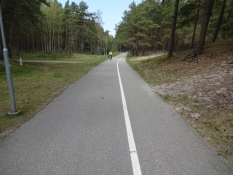
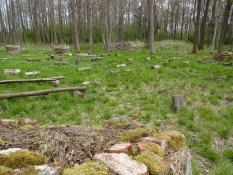
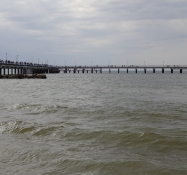
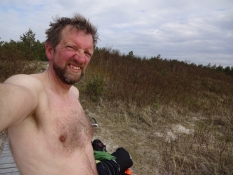
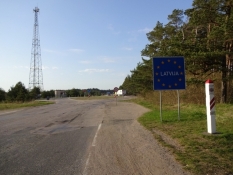
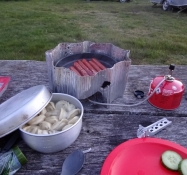
After having 'raided' a cash dispenser I was northbound on my bike. My plans were to reach a campsite about 20 km into Latvia before dusk so now I had to get moving. And how pleasurable it was to cycle along on splendid tarmac paths forming tracks of their own through the coastal forest, which seems to follow all of the coastline to Riga, Lativa's capital. Here in Lithuania it was a holiday country with camp sites and a few bungalows with a large and deserted forest between the towns and villages. At one place the path was interrupted by a major piping project. I had to take off the luggage, lift my bike into the excavation and on to the road on the other side before repositioning the bags and panniers. In Denmark there would probably have been some detour or crossing point, but not here. Do it yourself! But that couldn't ruin my high spirits and joy about rolling effortlessly along without headwind and in nice warm temperatures. Next to a ruin I stopped to have lunch from the supplies I had bought in Sweden. The ruin proved to be a church that had been destroyed during the war and wasn't been rebuilt. The Soviet Union officially was an atheistic state and totally neglected its people's need for religious services. Now the Lithuanians apperantly wished to demonstrate this fact instead of giving the village a new church. The place was called Nemirseta. IThe Germans made Nimmersatt (means "never saturated") of that. This name features in the German words "Nimmersatt, wo das Reich sein Ende hat ("Nimmersatt, where the Reich has its end"). I thought about how far from here it is to Germany's actual coastal border west of Swinoujscie, Poland. That's how it ends, when you're never saturated, I thought. Take that, Germans. Hopefully they've learned of history in the end. I'd like to add to that that Germany was treated very harshly and somewhat unjust after World War I which ended catastrophically in the Nazi imperialism. Humiliating a super power is never a wise thing. The Western allies had learned that lesson after World War II letting West Germany develop into a Democratic country and supplying her with Marshall aid. But nowadays we're doing it all over again with Russia. This country lost the Cold War after all and with Communism's fall she lost a lot of its power in itself. Thank you for that but the Russian state doesn't deserve to be humiliated with sanctions and a new cold war atmosphere towards it. It's both stupid and dangerous. Not the least for the Baltic states. That's what I pondered about while chewing my sandwiches, when a younger couple in smart cycling outfit came by and started asking me quiestions. We had a good chat in Russian about my oncoming cycling holiday. They were on a daytrip home from the Latvian border to Klaipeda. They were Lithuanians and felt themselves Lithuanian but spoke fluently Russian even if they were too young to having lived in the Soviet Union. I appreciated that because not only is i nice for me have some training in this language, but also because it shows that Russian is still considered to be an important language despite the sinister past and the new complicated relations to Russia. My next stop was the bathing resort of Palanga. Summer life was really enjoyed here on this Friday afternoon on the beach, on the long pier, in cafes and around amusements for children. I also sat down for a cup of coffee and a pie at a café idly watching people relax. Soon after my coffee break I saw a sign saying "To the naturist beach". Well, a quick skinny dip was not out of the question, so I went out on a quite splendid wooden bridge up and down the dunes. The beach was totally deserted, so no one took notice of me. This perfect sandy beach stretches all along the coastline, and at a day like this, the last warm day for several weeks, its emptiness seems even more surprising.. After my swim a put on more clothes and speeded up. I still had to shop for groceries in the last Lithuanian town before the border. So in Sventoji I filled up my panniers with supplies for a day as there were no shops on my route before Liepaja the next day.. The remaining items I left in the plastic bag, which I strapped on top of my rear luggage. But apparantly not well enough, because a few kilometres before my goal at the camp site Pukarags it slid down on the gravel road and the can of beer, I had intended to have with my supper was punctured and the beer splashed into the plastic bag. I blame the bad road. As soon as I crossed the border to Latvia I began looking for places to put my front wheel in order to avoid the potholes in the road. Especially when I turned off the main road onto the gravel road to the coast. Very coarse gravel with sand inbetween made the front wheel hard to control. I really just yearned for arriving at the campsite now, but it was a long slog into the national park of Pape with extensive bogs and salty marshes. Actually quite beautiful but I was now weary and hungry. Luckily the sun was still shining and at eight o'clock I dialled the number outside the deserted reception at Pukarags. A girl told me to find a place to pitch my tent myself and pay the camping fee tomorrow morning. There was plenty of space and I chose a spot next to a bench and a table, where I cooked my supper. A group of youngsters had a noisy party wth lots of booze and one of them came by and offered me a drink for welcome, some moonshine. I thanked as I had only water to drink with my pelmeni, a kind of fat tortellini with roasted sausages and slices of cucumber. A German couple from Bremen also came out of their caravan next to my tent. They had kayaks strapped to the roof of their car and had plans for a tour on the Baltic sea tomorrow. They had toured Latvia extensively in the car and told me about the bad roads. The one to the campsite wasn't especially bad. Just Latvian 'standard road', as they called it. I sighed. If I knew then what I know now I would have slept badly. But for now I was a happy bike tourist and spent the last hours of the day on the beach, where the partying youngsters had a bofire. And a lot of beer. They spoke English quite well and were Lithuanians disporting in the Latvian freedom, as many things were allowed here that are forbidden in Lithuania, e.g. having a bonfire on the beach. As they put it themselves, they drank a lot more than they biked. Their goal was the big town of Liepaja the next day where I also wanted to go. But I felt no urge to accompany them. But I should have listened to their advice of going back to the main road on this nasty gravel road in stead of my plans to go directly north. Well, that's for tomorrow. One of them kept saying 'it's not easy', meaning me, as I was travelling alone and had to manage everything myself. He said it with a slightly ironical and babbling intonation. From then on I repeated his words and intonation a lot of times in my thoughts when i expecienced trouble on my bike tour: "It's not easy!" But this evening was truly magnificent. Warm and quiet, apart from the crying and howling of the young Lithuanians.Soon I bade them a happy farewell and departed for my sleeping bag. I heard them come near my tent with suggestions to join them but they couldn't bother me. I bet they considered me very boring.
Informationen zu Urheber-Rechten | |
|---|---|
Rechte-Ausprägung / Lizenz | by-sa: CREATIVE COMMONS Namensnennung, Weitergabe unter gleichen Bedingungen |
Link zur Rechtebeschreibung | |
übernommen / bearbeitet am | 29.07.2017 - 30.07.2017
|
übernommen / bearbeitet durch |
|
